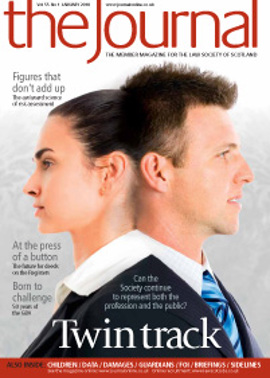Hearing and speaking

Important changes are in the offing for the children’s hearing system. Very soon the Scottish Government will be presenting to the Scottish Parliament a Children’s Hearings (Scotland) Bill which will restructure the way the system operates, though without, one hopes, departing significantly from the foundational principles upon which the system is based.
Doubtless these changes will be discussed fully in these pages and elsewhere in months and years to come. But there have already been significant changes. Legal representation for children has been available since the coming into force of the Children’s Hearings (Legal Representation) Rules 2002, and more recently legal representation of relevant persons has been available since 4 June 2009, when the Children’s Hearings (Legal Representation) Amendment Rules 2009 (SSI 2009/211) came into force.
The 2002 Rules were enacted as a result of the Inner House’s decision in S v Miller 2001 SLT 531, that it was contrary to the child’s right to a fair hearing, protected by article 6 of the European Convention on Human Rights, not to have funded legal representation in (very basically) two situations: where sending the child to secure accommodation is under active consideration, and where the child would not, without legal representation, be able effectively to participate at the hearing. The 2009 amendments to these rules were designed to pre-empt another Inner House decision, that of K v Authority Reporter 2009 SLT 1019, and they permit funded legal representation of relevant persons where this is necessary to ensure that the person being represented has the chance to participate effectively at the hearing.
The court in K v Authority Reporter accepted that the failure to provide state-funded legal representation of relevant persons amounted to an “in-built systemic flaw in the legal aid scheme as it applied to the children’s hearing system” (para 60). The 2002 Rules, now amended, establish what has always been described as an “interim scheme”, but that scheme will continue to apply unless and until it is replaced by new rules to be contained in the 2010 Bill.
Effective participation
The key concept in the current scheme is that of “effective participation”. The rules do not provide that legal representation of children and parents is available at all hearings. Instead they are designed to address the issue that was before the Court of Session in both the cases mentioned above: when does article 6 of the European Convention require a party to civil proceedings to be provided with state-funded legal representation? The answer given in both cases was that this was required when the party would not otherwise be able to participate effectively in the proceedings.
“Effective participation” is the ability to contribute to the decision-making process in a way that communicates the main point of view of the participant to the hearing members. This has to be read in light of what is expected by way of participation. It is not expected that a one-year-old child will participate, and so hearings do not routinely appoint legal representatives to children of that age. The decision always needs to be made in the context of the nature of the participation that is required, and the stage in the process.
For example, at a grounds hearing, a relevant person who cannot understand, cannot give agreement, and the matter must be sent to the sheriff for proof. There is no effective participation needed there, and the fact that a legal representative would understand the grounds is neither here nor there: the matter goes to the sheriff if the relevant person cannot understand the grounds, even if that person’s legal representative does. So in that type of case there is no need to appoint a legal representative (at least at that stage).
Similarly if the hearing is a simple and straightforward one in which there is no change proposed and limited scope for discussion, “effective participation” can be interpreted at a much lower level than in a complex hearing with much contention.
It would be wrong for hearings to adopt a policy of automatically making an appointment if a specified set of circumstances presents itself, for example in all cases in which the relevant person comes to the hearing under the influence of drugs or drink. Hearings must at the very least assume that the relevant person has capacity to participate effectively, and must make an individualised judgment that this is just not possible in the case before them. It may well be that (except perhaps in the most extreme cases) the panel members will have to attempt to conduct a hearing and give the relevant person the chance to participate before concluding that, in fact, the person is incapable of effective participation. If a person attends the hearing the worse for wear through drink or drugs and is clearly unable effectively to participate, the proper approach will be to continue the hearing to allow the person to sober up, rather than to appoint a legal representative.
Further guidance
In K v Authority Reporter the Inner House was asked to give some guidance as to when it would be appropriate for hearings to make an appointment of a legal representative. They said this in response:
“In our opinion guidance on this particular issue is to be found in Marangos v Cyprus [2008] ECHR 1604 in para 35 of the judgment of the ECtHR: ‘The question whether the provision of legal aid is necessary for a fair hearing must be determined on the basis of the particular facts and circumstances of each case and will depend, inter alia, upon the importance of what is at stake for the applicant in the proceedings, the complexity of the relevant law and procedure and the applicant’s capacity to represent him or herself effectively.’
“In our opinion, that broad approach falls to be applied to the particular facts and circumstances of the case in which an individual’s Convention rights under article 6(1) are engaged, including the personal characteristics and capabilities of the individual concerned. Those facts and circumstances will include, but are not limited to, the importance and potentially long term consequences of decisions taken at children’s hearings, the stress that may be experienced by parties involved in proceedings relating to family life, the complexity of the factual and legal issues involved, the ability of the individual to understand those issues and the contents of any reports or other documents relevant to those issues, and the availability of any representatives prepared to assist the individual during the hearing.”
It is also to be noted that a new rule 3B was added into the 2002 Rules by the 2009 amendments, and it provides that “A person’s ability to effectively participate in a children’s hearing may be affected, in particular, by” a number of factors, including “(a) the complexity of the case, including the points of law in issue; (b) the nature of the issues involved; (c) the ability of the individual… to consider and challenge any document or information before the hearing; (d) the ability of the individual… to present their views in an effective manner”.
It is ability to challenge any document or statement made at the hearing that is crucial to effective participation. Too often in the past statements which should have been challenged have been accepted by the hearing simply because no one was able to challenge them.
Role of the legal representative
The regulations do not specify the role that the legal representative is to play. It is to be remembered that there are other participants, who may well be able to assist in the child’s or relevant person’s participation. The legal representative is different: he or she will act on behalf of his or her client and is not to be seen as playing the same role as the safeguarder, or other representative of the child. In other words, the legal representative will take instructions from the client, and act upon them: the legal representative has no role in assessing the welfare of the child (or at least no more of a role than they would have in a normal residence or contact dispute before the sheriff).
The interim scheme is likely to be with us for some years to come. It is not expected that legal representatives will appear at hearings as a matter of course, but it is generally beneficial to everyone when they do appear. Lawyers are trained to act as procedural watchdogs, and to articulate the points of view of those whom they represent. So long as children’s hearings continue to operate discursively in the search for a solution that best meets the child’s needs, it will remain of crucial importance that each participant’s point of view is expressed effectively and taken into account. Not only will this consist with article 6 of the European Convention, but it will consist with the very philosophy by which the children’s hearing system has always operated.
Kenneth McK Norrie is a Professor of Law in the University of Strathclyde
In this issue
- Forward thinking
- Renewal of transitional guardianships
- End the navel-gazing
- Who speaks for lawyers?
- Reasons to be hopeful
- The full picture
- Hearing and speaking
- Law of unintended consequences
- More prejudicial than probative?
- One giant leap
- If the cap fits
- Half a century of strife
- From the Brussels office
- Law reform update
- Send in the SaaS
- Ask Ash
- Words and sentences
- Two in one
- Enough to turn you to drink
- Uncertain security
- Protections with legs
- Working for the estate
- Home defences
- Splitting from the taxman
- Scottish Solicitors' Discipline Tribunal
- Website review
- Book reviews
- Route to freedom
- Steady as she goes is market forecast






